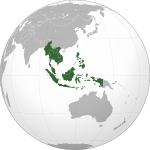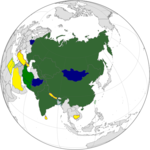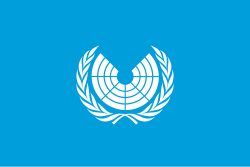World government
Contents[show] |
[edit] History
[edit] Empires
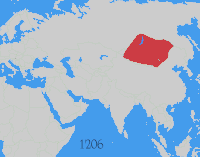
[edit] Persian Empire
Under Cyrus the Great and Darius I the Persians founded one of the world's first stable empires based around the area of modern day Iran and Iraq. At its height, the empire was, arguably, the largest and most powerful state in the world, stretching from the banks of the Indus river in the area of modern-day Pakistan to roughly what now forms the westernmost boundaries of modern-day Turkey. The empire itself was widely known for its immense wealth, and it had a highly-developed bureaucracy which governed and maintained order over every part of the empire. The empire's prosperity,wealth and power drew both the admiration and envy of neighboring states, and later inspired the Ancient Macedonian king Alexander the Great to invade the empire and seize it for himself.[edit] Asokan India

[edit] Roman Empire
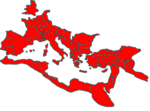
Pax Romana (Latin for "Roman peace") was the long period of relative peace and minimal expansion by military force experienced by the Roman Empire in the 1st and 2nd centuries AD. Since it was established by Caesar Augustus it is sometimes called Pax Augusta. Its timing was approximately 200 years (27 BC to 180 AD).
[edit] Sa'di
Sa'di (poet), a medieval Persian poet, considered the essence of mankind to be one and implicitly called for the elimination of racial, political and national boundaries. The most famous aphorism of Sa'di is this call for breaking all barriers.Of One Essence is the Human Race,
Thusly has Creation put the Base.
One Limb impacted is sufficient,
For all Others to feel the Mace.
The Unconcern'd with Others' Plight,
Are but Brutes with Human Face.
[edit] Hugo Grotius
[edit] Jean Jacques Rousseau
| Please help improve this article by expanding it. Further information might be found on the talk page. (October 2009) |
[edit] United States
| This section requires expansion. |
[edit] Immanuel Kant

The "Preliminary Articles" described the steps that should be taken immediately, or with all deliberate speed:
- "No Secret Treaty of Peace Shall Be Held Valid in Which There Is Tacitly Reserved Matter for a Future War"
- "No Independent States, Large or Small, Shall Come under the Dominion of Another State by Inheritance, Exchange, Purchase, or Donation"
- "Standing Armies Shall in Time Be Totally Abolished"
- "National Debts Shall Not Be Contracted with a View to the External Friction of States"
- "No State Shall by Force Interfere with the Constitution or Government of Another State"
- "No State Shall, during War, Permit Such Acts of Hostility Which Would Make Mutual Confidence in the Subsequent Peace Impossible: Such Are the Employment of Assassins (percussores), Poisoners (venefici), Breach of Capitulation, and Incitement to Treason (perduellio) in the Opposing State"
- "The Civil Constitution of Every State Should Be Republican"
- "The Law of Nations Shall be Founded on a Federation of Free States"
- "The Law of World Citizenship Shall Be Limited to Conditions of Universal Hospitality"
[edit] Karl Krause
| This section requires expansion. |
[edit] Bahá'u'lláh
Though not playing a significant role in Western history, between 1852 and 1892 Bahá'u'lláh founded the Bahá'í Faith, a religion which identified the establishment of a global commonwealth of nations as a key principle.[2] He envisioned a set of new social structures based on participation and consultation among the world's peoples, including a world legislature, an international court, and an international executive empowered to carry out the decisions of these legislative and judicial bodies. Connected principles of the Bahá'í religion include universal systems of weights and measures, currency unification, and the adoption of a global auxiliary language.[3] The Bahá'í Faith currently counts in excess of 5 million members spread across the globe.[edit] Switzerland
| This section requires expansion. |
[edit] Ulysses S. Grant
| This section requires expansion. |
Wendell Wilkie expanded on this notion in his book One World.
[edit] International Peace Congress
| This section requires expansion. |
[edit] International organizations

[edit] League of Nations
[edit] Atlantic Charter
| Please help improve this article by expanding it. Further information might be found on the talk page. (October 2009) |
[edit] United Nations

[edit] World Federalist Movement
Similar movements concurrently formed in many other countries, leading to the formation, at a 1947 meeting in Montreux, Switzerland, of a global coalition, now called World Federalist Movement. By 1950, the movement claimed 56 member groups in 22 countries, with some 156,000 members. In France, 1948, Garry Davis began an unauthorized speech calling for a world government from the balcony of the UN General Assembly, until he was dragged away by the guards. Mr. Davis renounced his American citizenship and started a Registry of World Citizens, which claimed to have registered over 750,000 people in less than two years. Opinion polls carried out by UNESCO in 1948-1949 found world government favored by a majority of respondents in six European countries and rejected in three other countries (Australia, Mexico and the United States)[citation needed]. On September 4, 1953, Davis, from the City Hall of Ellsworth, Maine, announced the formation of the "World Government of World Citizens" based on 3 "World Laws" — One God (or Absolute Value), One World, and One Humanity.[5] Following this declaration mandated he claimed by article 21(3) of the Universal Declaration of Human Rights, he formed the United World Service Authority in New York City as the administrative agency of the new government. Its first task was to design and issue a "World Passport" based on article 13(2) of the UDHR. To date, over 800,000 of these documents have been issued to individuals worldwide. They have been recognized de facto by over 150 countries.[6]
[edit] World Passport (1953)
[edit] Legal Realism (1954)
[edit] The end of the Cold War (1990)
While enthusiasm for multinational federalism in Europe incrementally led, over the following decades, to the formation of the European Union, the onset of the Cold War (1950–1990) eliminated the prospects of any progress towards federation with a more global scope. The movement quickly shrunk in size to a much smaller core of activists, and the FWG idea all but disappeared from wide public discourse.Following the dissolution of the Soviet Union in 1991, interest in a federal world government and, more generally, in the global protection of human rights, was renewed. The most visible achievement of the world federalism movement during the 1990s is the Rome Statute of 1998, which led to the establishment of the International Criminal Court in 2002. In Europe, progress towards forming a federal union of European states gained much momentum, starting in 1952 as a trade deal between the German and French people lead, in 1992, to the Maastricht Treaty that established the name and enlarged the agreement that the European Union (EU) is based upon. The EU expanded (1995, 2004, 2007) to encompass, in 2007, nearly half a billion people in 27 member states. Following EU's example, the African Union was founded in 2002 and the Union of South American Nations in 2004.
[edit] Caliphate
More recently a minor movement in Islam has called for a world Caliphate, whereby sharia law would be applied to everyone, everywhere.[9][10][edit] Existing regional unions of nations
There are a number of other regional organisations that, while not supranational unions, have adopted or intend to adopt policies that may lead to a similar sort of integration in some respects.
- African Union (AU)
- Association of Southeast Asian Nations (ASEAN)
- Central American Integration System (SICA)
- Cooperation Council for the Arab States of the Gulf (CCASG)
- Commonwealth of Independent States (CIS)
- Eurasian Economic Community (EurAsEC)
- South Asian Association for Regional Cooperation (SAARC)
- Union of South American Nations (UNASUR)
- Union State
- Arab League
- Caribbean Community (CARICOM)
- Arab League into an "Arab Union"
- North American Free Trade Agreement (NAFTA) into the "North American Union"
- Pacific Islands Forum into the "Pacific Union"
- Caribbean Community (CARICOM) into a Caribbean Federation
[edit] European Union
The most relevant model for the incremental establishment of a global federation may be the European Union, which politically unites a large group of widely diverse, some formerly hostile, nations spread over a large geographical area and 500 million people. Though the EU is still evolving, it already has many attributes of a federal government, such as open internal borders, a directly elected parliament, a court system, an official currency (Euro) and a centralized economic policy.The EU's lead is being followed by the African Union, the Union of South American Nations, the Organization of Central American States, and the Association of Southeast Asian Nations. A multitude of regional associations, aggregating most nations of the world, are at different stages of development towards a growing extent of economic, and sometimes political, integration.
[edit] CARICOM
The Caribbean Community (CARICOM), is an organization of 15 Caribbean nations and dependencies. CARICOM's main purpose is to promote economic integration and cooperation among its members, to ensure that the benefits of integration are equitably shared and to coordinate foreign policy.[1] Its major activities involve coordinating economic policies and development planning; devising and instituting special projects for the less-developed countries within its jurisdiction; operating as a regional single market for many of its members CARICOM Single Market and Economy (CSME); and handling regional trade disputes.Since the establishment of the Caribbean Community (CARICOM) by the mainly English Creole-speaking parts of the Caribbean region CARICOM has become multilingual in practice with the addition of Dutch speaking Suriname on 4 July 1995 (although the lingua franca in Suriname is Sranan Tongo, which is an English-based Creole like the languages spoken in much of the rest of CARICOM) and Haiti, where French and Haitian Creole are spoken, on 2 July 2002. In 2001, the heads of government signed a Revised Treaty of Chaguaramas in Trinidad and Tobago, clearing the way for the transformation of the idea for a Common Market aspect of CARICOM into instead a Caribbean (CARICOM) Single Market and Economy. Part of the revised treaty among member states includes the establishment and implementation of the Caribbean Court of Justice (CCJ).'
[edit] African Union
The African Union (AU) is an organisation consisting of fifty-three African states. Established on July 9, 2002, the AU was formed as a successor to the amalgamated African Economic Community (AEC) and the Organisation of African Unity (OAU). Eventually, the AU aims to have a single currency and a single integrated defence force, as well as other institutions of state, including a cabinet for the AU Head of State. The purpose of the union is to help secure Africa's democracy, human rights, and a sustainable economy, especially by bringing an end to intra-African conflict and creating an effective common market.Projects for improved economic and political cooperation are also happening at a regional level with the Arab Maghreb Union, the Economic Community of West African States, the Economic Community of Central African States the Southern African Development Community and the East African Community.
[edit] ASEAN
ASEAN, pronounced /ˈɑːsiːɑːn/ AH-see-ahn in English, or the Association of Southeast Asian Nations, is a geo-political and economic organization of 10 countries located in Southeast Asia, which was formed on August 8, 1967 by Indonesia, Malaysia, the Philippines, Singapore, and Thailand[12] as a display of solidarity toward communist expansion in Vietnam and insurgency within their own borders. Its claimed aims include the acceleration of economic growth, social progress, cultural development among its members, and the promotion of regional peace.[13] All members later founded the Asia Cooperation Dialogue, which aims to unite the entire continent.[edit] Shanghai Cooperation Organisation
The Shanghai Cooperation Organisation (SCO) is an intergovernmental organization which was founded on June 14, 2001 by the leaders of the People's Republic of China, Russia, Kazakhstan, Kyrgyzstan, Tajikistan and Uzbekistan. Except for Uzbekistan, these countries had been members of the Shanghai Five; after the inclusion of Uzbekistan in 2001, the members renamed the organization.[edit] Commonwealth of Independent States
The Commonwealth of Independent States is comparable to a confederation similar to the original European Community. Although the CIS has few supranational powers, it is more than a purely symbolic organization, possessing coordinating powers in the realm of trade, finance, lawmaking, and security. It has also promoted cooperation on democratization and cross-border crime prevention. As a regional organization, CIS participates in UN peacekeeping forces.[14] Some of the members of the CIS have established the Eurasian Economic Community with the aim of creating a full-fledged common market.[edit] Arab League
The Arab League is a regional organization of Arab states in Southwest Asia, and North and Northeast Africa. It was formed in Cairo on March 22, 1945 with six members: Egypt, Iraq, Transjordan (renamed Jordan after 1946), Lebanon, Saudi Arabia, and Syria. Yemen joined as a member on May 5, 1945. The Arab League currently has 22 members, which also include, Algeria, Bahrain, Comoros, Djibouti, Kuwait, Libya, Mauritania, Morocco, Oman, Palestine, Qatar, Somalia, Sudan, Tunisia and UAE. It has also been proposed to reform the Arab League into an Arab Union. the Arab League currently is the most important organization in the region.[edit] Union of South American Nations
The Union of South American Nations was founded in 2006-2008 and is modeled on the European Union. It incorporates all the independent states of South America. These states are Argentina, Bolivia, Brazil, Chile, Colombia, Ecuador, Guyana, Paraguay, Peru, Suriname, Uruguay, and Venezuela.[edit] South Asian Association for Regional Cooperation
The South Asian Association for Regional Cooperation (SAARC) is an economic and political organization of eight countries in Southern Asia. In terms of population, its sphere of influence is the largest of any regional organization: almost 1.5 billion people, the combined population of its member states. It was established on December 8, 1985 by India, Pakistan, Bangladesh, Sri Lanka, Nepal, Maldives and Bhutan. In April 2007, at the Association's 14th summit, Afghanistan became its eighth member.[edit] Organization of the Islamic Conference
| | ||
|---|---|---|
| Headquarters | Jeddah, Saudi Arabia | |
| Official languages | Arabic, English, French | |
| Membership | 57 member states | |
| Leaders | ||
| - | Secretary-General | Ekmeleddin İhsanoğlu |
| Website http://www.oic-oci.org/ | ||
Since the nineteenth century, many Muslims had aspired to uniting the Muslim ummah to serve their common political, economic, and social interests. Despite the presence of secularist, nationalist, and socialist ideologies, in modern Muslim states, they have cooperated together to form the Organisation of the Islamic Conference. The formation of the OIC happened in the backdrop of the loss of Muslim holy sites in Jerusalem. The final cause sufficiently compelled leaders of Muslim nations to meet in Rabat to establish the OIC on September 25, 1969.[15]
According to its charter, the OIC aims to preserve Islamic social and economic values; promote solidarity amongst member states; increase cooperation in social, economic, cultural, scientific, and political areas; uphold international peace and security; and advance education, particularly in the fields of science and technology.[15]
The flag of the OIC (shown above) has an overall green background (symbolic of Islam). In the centre, there is an upward-facing red crescent enveloped in a white disc. On the disc the words "Allahu Akbar" (Arabic for "Allah is great") are written in Arabic calligraphy.
On August 5, 1990, 45 foreign ministers of the OIC adopted the Cairo Declaration on Human Rights in Islam to serve as a guidance for the member states in the matters of human rights in as much as they are compatible with the Sharia, or Quranic Law.[16]
[edit] The World Constitution and Parliament Association
The World Constitution and Parliament Association (WCPA) was created in 1958 to promote democratic world government. During the next 33 years the WCPA held four Global Constituent Assemblies centered around creating a Constitution for the Federation of Earth. At the fourth assembly in Troia, Portugal in 1991, final amendments to the Constitution were made and approved. Even before this assembly, the organization has been involved in a worldwide campaign to ratify the Earth Constitution under the provisions set forth in Article 17. Since 1982, the WCPA has also organized sessions of the Provisional World Parliament, the first of which was in Brighton, England and the tenth session of which was in Kara, Togo in 2007. Under the authority of Article 19 of the Constitution, the Parliament debates and passes provisional world legislation that serves as a model and a guide for developing democratic world government. The Parliament also works toward a founding ratification convention at which the nations and people of Earth join together to ratify the Constitution and initiate a new demilitarized, democratic world order.[edit] United Nations Parliamentary Assembly
[edit] The current global governance system
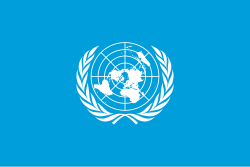
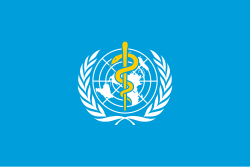
The Earth is divided geographically and demographically into mutually-exclusive territories and political structures called states which are independent and sovereign in most cases. One may also make the case that political and economical independence, although related, are not the same, and even though former colonies have acquired political independence since World War II, they have become more dependent upon each other financially. There are numerous bodies, institutions, unions, coalitions, agreements and contracts between these units of authority, but, except in cases where a nation is under military occupation by another, all such arrangements depend on the continued consent of the participant nations. Thus the use of violence is unprohibited throughout the realm and is only checked by the threat of retaliatory violence or nonviolent sanctions (see Gene Sharp), so where no such threat exists a nation may use violence against another.
Among the voluntary organizations and international arrangements the following are:
- The United Nations (UN) is the primary formal organization coordinating activities between states on a global scale and the only inter-governmental organization with a truly universal membership (192 governments). In addition to the main organs and various humanitarian programs and commissions of the UN itself, there are about 20 functional organizations affiliated with the UN's Economic and Social Council (ECOSOC), such as the World Health Organization, the International Labour Organization, and International Telecommunications Union.[19] Of particular interest politically are the World Bank, the International Monetary Fund and the World Trade Organization.
- The World Bank and the International Monetary Fund (IMF), were formed together at the Mount Washington Hotel in Bretton Woods, New Hampshire, United States in July 1944, to foster global monetary cooperation and to fight poverty by financially assisting states in need. The World Trade Organization (WTO) sets the rules of international trade. It already has a semi-legislative body (The General Council, reaching decisions by consensus), and a judicial body (The Dispute Settlement Body). Another influential economical international organization is the Organisation for Economic Co-operation and Development (OECD), with membership of 30 democratic members.
- G8, an association of the eight highest GDP Nations of the World. The leaders of the G8 countries meet annually in person to coordinate their policies in confronting global issues, such as poverty, terrorism, infectious diseases, and climate change.
- G20, an association of twenty developing and established nations and entities, including the European Union.
- Militarily, the UN deploys peacekeeping forces, usually to build and maintain post-conflict peace and stability. When a more aggressive international military action is undertaken, either ad-hoc coalitions (e.g., multinational force in Iraq), or regional military alliances (e.g., NATO) are used.
- International law encompasses international treaties, customs, and globally acceptable legal principles. With the exceptions of cases brought before the ICC and ICJ (see below), the laws are interpreted by national courts. Many violations of treaty or customary law obligations are overlooked.
- The International Court of Justice (ICJ) (also known as World Court) is the judiciary organ of the United Nations. It settles disputes submitted to it voluntarily by states (only), and gives advisory opinions on legal questions submitted to it by other organs of the UN, such as the General Assembly or Security Council.
In addition to the formal, or semi-formal, international organizations and laws mentioned above, many other mechanisms act to regulate human activities across national borders. In particular, international trade in goods, services and currencies (the "global market") has a tremendous impact on the lives of people in almost all parts of the world, creating deep interdependency amongst nations (see globalization). Trans-national (or multi-national) corporations, some with resources exceeding those available to most governments, govern activities of people on a global scale. The rapid increase in the volume of trans-border digital communications and mass-media distribution (e.g., Internet, satellite television) has allowed information, ideas, and opinions to rapidly spread across the world, creating a complex web of international coordination and influence, mostly outside the control of any formal organizations or laws.
[edit] World governments in fiction
| | It has been suggested that this section be split into a new article. (Discuss) |
[edit] In literature
- In the dream book in H.G. Wells The Shape of Things to Come, after first appearing in the early 20th century, and only after more than a hundred years of war and disaster in which those religiously [20] committed to it does an atheistic and socialist world state arise from the ashes of the old order which completely destroys itself .
- Robert A. Heinlein's Starship Troopers, which was later adapted into a series of films, featured a militaristic world government where people must become "Citizens" through military or civil service in order to vote.
- Frank Herbert's Dune universe is ruled by the Emperors of the Known Universe
- In Orson Scott Card's "Shadow of the Giant", Peter Wiggin becomes Hegemon over the Earth through an alliance known as the Free People of Earth.
- In Larry Niven's Known Space universe, the United Nations is the de facto world government. It imposes the death penalty for nearly every crime, however trivial, and executed criminals are broken up for their organs. In addition, it practices laissez-faire eugenics via a so-called "fertility board", and suppresses technology it deems as "dangerous".
- In Aldous Huxley's Brave New World.
- In George Orwell's Nineteen Eighty-Four, world government is divided between several superstates, which continually war against each other to maintain fear and blind nationalism in the masses.
- In the book Invitation to the Game by Monica Hughes
- In the Left Behind series, the Antichrist Nicolae Carpathia leads the Global Community, a world government which was created after the Rapture.
- In Eiichiro Oda's popular manga series One Piece, there is a world government which controls most, if not all of the smaller governments in the fictional universe.
[edit] In television
- In Star Trek, the Earth is united under one government in the 22nd century. United Earth is the name of the planetary state created through the unification of Earth in the 22nd century following First Contact in 2063. United Earth continued to exist as a political subdivision of the United Federation of Planets when its government helped found that interstellar state in 2161. In Star Trek's mirror universe, the Earth is unified as the Terran Empire.
- In Gerry Anderson's Thunderbirds, Captain Scarlet and the Mysterons, Fireball XL5, Stingray and Joe 90 the world is governed by some form of World Government that is involved in or in charge of most of the organisations featured.
- In the Indian series Captain Vyom, a futuristic sci-fi in which the Earth is united under a common Government with headquarter in New Delhi, India and Captain Vyom being the top agent in law enforcement.
- In the Japanese manga "One Piece", the world is ruled by a corrupt system called simply the "World Government". This organization allows such things as slavery, torture in prisons, killing of innocents, as well as other grotesque acts.
[edit] See also
| Wikiquote has a collection of quotations related to: World government |
[edit] Resources
[edit] Published works
- Allida Black, June Hopkins, NPS.gov, "League of Nations." 2003, (accessed 4/9/2008)
- Archibugi, Daniele, Amazon.com, "The Global Commonwealth of Citizens. Toward Cosmopolitan Democracy", (Princeton, Princeton University Press, 2008).
- Baratta, Joseph. Barnesandnoble.com, The Politics of World Federation, (Westport, CT: Greenwood Publishing Group, 2003). Introduction available Globalsolutions.org
- Bruner Michael, Melissa Green, Lawrence McBride, The NYSTROM Atlas of World History, Edition 1, The NYSTROM Atlas, Volume 1, World History, Chicago, NYSTROM, 2004.
- Cabrera, Luis. Political Theory of Global Justice: A Cosmopolitan Case for the World State (London: Routledge, 2004;2006).
- Daniel Chu and Elliot Skinner, A Glorious Age in Africa, Edition 1, None, Volume 1, A Glorious Age in Africa, Tenton, Africa World Press, 2000.
- Davis, Garry, My Country Is The World, (G.P. Putnam Sons, 1961).
- Davis, Garry, World Government, Ready or Not! (World Government House, South Burlington, VT 05407, 1984).
- Davis, Garry, Passport to Freedom, (Seven Locks Press, Cabin John, MD, 1992).
- Davis, Garry, A World Citizen In the Holy Land, (World Government House, South Burlington, VT 05407
- Davis, Garry, Dear World, A Global Odyssey, (World Government House, South Burlington, VT, 05407,2000)
- Davis, Garry, Letters to World Citizens, (World Government House, South Burlington, VT, 05407, 2004).
- Davis, Garry, Views From My Space, (World Government House, South Burlington, VT, 05407, 2009).
- Craig, Campbell. Glimmer of a New Leviathan: Total War in the Realism of Niebuhr, Morgenthau, and Waltz (New York: Columbia University Press, 2003).
- Deudney, Daniel. Bounding Power: Republican Security Theory from the Polis to the Global Village (Princeton, NJ: Princeton University Press, 2006).
- Dervis, Kermal. A Better Globalization: Legitimacy, Governance, and Reform. (Washington: Center for Global Development, 2005.) Selections available CGDEV.org
- Etzioni, Amitai. From Empire to Community: A New Approach to International Relations (New York: Palgrave Macmillan, 2004)
- Hamer, Chistopher. UNW.edu.au, Global Parliament - Principles of World Federation (Oyster Bay, NSW: Oyster Bay Books, 1998.)
- Hooker, Richard, WSU.edu, 2/14/2008 "The Mongolian Empire: The Yuan" (6/6/1999)
- Marchetti, Raffaele. Global Democracy: For and Against. Ethical Theory, Institutional Design and Social Struggles (London: Routledge, 2008). ISBN 978-0-415-55495-4
- Monbiot, George. Thenewpress.com, Manifesto for a New World Order, (New York: New Press, 2005). Published in the United Kingdom as Amazon.co.uk, Age of Consent.
- Rajan, Chella. GTinitiative.org, Global Politics and Institutions. GTI Paper 3#. (Boston: Tellus Institute, 2006). Additional papers in the GTI series available at GTinitiative.org.
- Strauss, Andrew. Oneworldtrust.org, Taking Democracy Global: Assessing the Benefits and Challenges of a Global Parliamentary Assembly. (London: One World Trust, 2005).
- Stark, Jim. Rescue Plan for Planet Earth: Democratic World Government through a Global Referendum (Toronto: Key Publishing House Inc, 2008)
- Tamir, Yael. "Who's Afraid of a Global State?" in Kjell Goldman, Ulf Hannerz, and Charles Westin, eds., Nationalism and Internationalism in the Post-Cold War Era (London: Routledge, 2000).
- Wendt, Alexander. “Why a World State is Inevitable,” European Journal of International Relations, Vol. 9, No. 4 (2003), pp. 491–542
- Yunker, James A. Political Globalization: A New Vision of Federal World Government (Lanham, MD: University Press of America, 2007).
- MSN Encarta, "World Government." 2007, (accessed 5/4/2008).
- Stanford Encyclopedia of Philosophy, "World Government." December 4, 2006. Stanford.edu, (accessed 4/13/2008).
- Trueman, Chris. "League of Nations." Historylearningsite.co.uk (accessed 4/9/2008).
- United Nations Staff, "History of the UN." 2000. UN.org (accessed 4/10/2008).
- We the People, The Roxbury Latin School.
[edit] Organizations
- The World Federalist Movement (WFM) is a global citizens movement with 23 member and 16 associated organizations around the globe working towards the establishment of a federated world government. The U.S. member organization is Citizens for Global Solutions, and the Canadian organization is World Federalist Movement - Canada
- The Centre for International Governance Innovation (CIGI) is a well-funded research and education center in Canada dedicated to the subject. It is preparing to launch IGLOO: "a global online research community focused solely on strengthening governance around the world."
- One World Trust (OWT) is a charity based in the United Kingdom and member of the World Federalist Movement. Its current work aims to promote reforms of existing global organizations leading to greater accountability.
- Civitatis International is a non-governmental organization based in the United Kingdom that produces legal research promoting increased systems of global governance to policymakers.
- The Committee for a Democratic UN is a network of parliamentarians and non-governmental organizations from Germany, Switzerland and Austria which is based on world federalist philosophy.
- Democratic World Federalists is a San-Francisco-based civil society organization with supporters worldwide, advocates a democratic federal system of world government.
- The World Government of World Citizens, founded September 4, 1953 in Ellsworth, ME, by former Broadway actor and WWII bomber pilot Garry Davis following the registering of 750,000 individuals worldwide as World Citizens by the International Registry of World Citizens, headquartered in Paris, January 1, 1949. Its main office is in Washington, DC.
[edit] Initiatives
- Vote World Parliament(VWP) is a Canadian NGO which has independently begun a global referendum posing the following question : Do you support the creation of a directly-elected, representative and democratic world parliament that is authorized to legislate on global issues?
[edit] References
- Ankerl, Guy. Global communication without universal civilization. INU societal research. Vol.1: Coexisting contemporary civilizations: Arabo-Muslim, Bharati, Chinese, and Western. Geneva: INU Press. ISBN 2-88155-004-5.
[edit] Notes
- ^ USYD.edu.au
- ^ Bahá'í International Community (1995). Turning Point for All Nations. http://bahai-library.com/uhj_turning_point_nations#II.
- ^ McMullen, Mike (2009). "The Bahá'í Faith". In Neusner, Jacob. World Religions in America (4 ed.). Louisville, Ky: Westminster John Knox Press. ISBN 0-664-23320-1.
- ^ Schwartzberg, Joseph E.. "Reform of the General Assembly" (PDF). Revitalizing the United Nations : Reform Through Weighted Voting. New York and The Hague: Institute For Global Policy, World Federalist Movement. pp. 3. ISBN 0-9710727-4-4. OCLC 56124473. http://oldsite.globalsolutions.org/programs/intl_instit/UN_ref/Schwartzberg_Weighted_Voting.pdf. Retrieved 2005-12-14.
- ^ Worldservice.org
- ^ Worldgovernment.org, Copies of visas
- ^ Romingerlegal.com, 99-1334 - U.S. v. THOMAS - 07/07/2000
- ^ The Law of Primitive Man (1954:331-333)
- ^ Pojman, Louis P. (2006). "The case for world government". Terrorism, human rights, and the case for world government. Lanham, MD: Rowman & Littlefield. p. 39. ISBN 978-0-7425-5160-2. "A minor movement in Islam has advocated a universal caliphate, applying sharia as universal law to all people everywhere."
- ^ Chaturvedy, J. C. (2005). "Concept of nationalism". Political Governance: Political theory. 2. Delhi: Isha Books. p. 99. ISBN 9788182053175.
- ^ Bauböck, Rainer (2007). "Why European Citizenship? Normative Approaches to Supranational Union". Theoretical Inquiries in Law (Berkeley Electronic Press) 8 (2, Article 5). ISSN 1565-3404. http://www.bepress.com/til/default/vol8/iss2/art5. Retrieved 2009-08-01. "A normative theory of supranational citizenship will necessarily be informed by the EU as the only present case and will be addressed to the EU in most of its prescriptions".
- ^ Bangkok Declaration. Wikisource. Retrieved March 14, 2007
- ^ Overview, ASEAN Secretariat official website. Retrieved June 12, 2006
- ^ Regional organizations in UN peacekeeping activitiesPDF (354 KB)
- ^ a b http://www.oic-oci.org/page_detail.asp?p_id=52
- ^ http://www1.umn.edu/humanrts/instree/cairodeclaration.html
- ^ Watson, Graham (26 September 2007. The Case for Global Democracy: Cross Party Coalition of MEPs calls for a UN Parliamentary Assembly. Graham Watson MEP. Retrieved on 7 December 2007.
- ^ UNPAcampaign.org, Over 600 MPs support call for UN Parliamentary Assembly - 4 February 2009, CEUNPA
- ^ UN.org, Chart
- ^ "And it must needs be the work, first of all, of an aggressive order of religiously devoted men and women who will try out and establish and impose a new pattern of living upon our race." Last sentence of the work in a footnote. Chapter 52 Part 9 A New Phase in the History of Life
[edit] External links
- World government entry by Catherine Lu in the Stanford Encyclopedia of Philosophy, December 4, 2006
- Immanuel Kant: "Perpetual Peace: A Philosophical Sketch" (English translation of "Zum ewigen Frieden")








